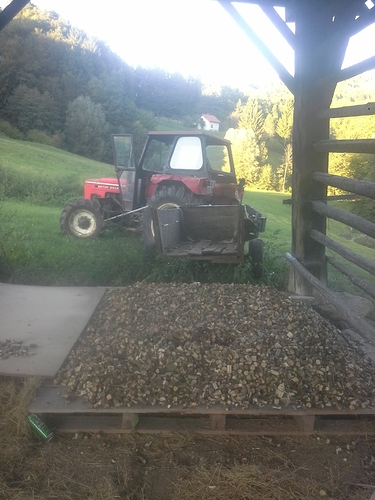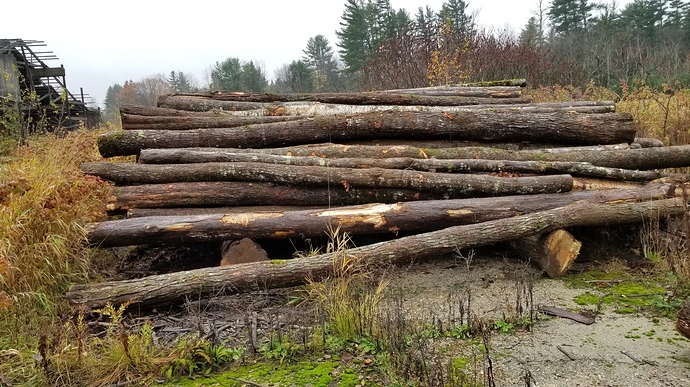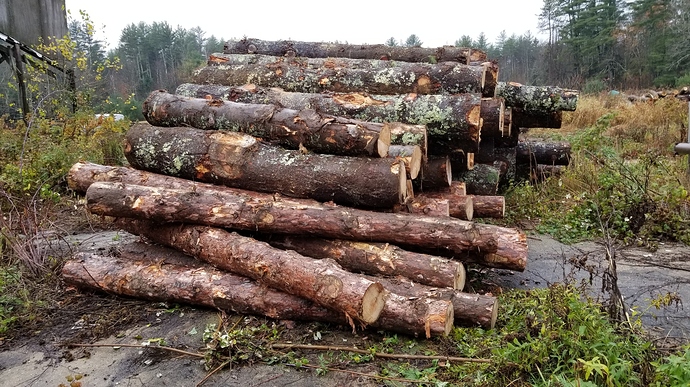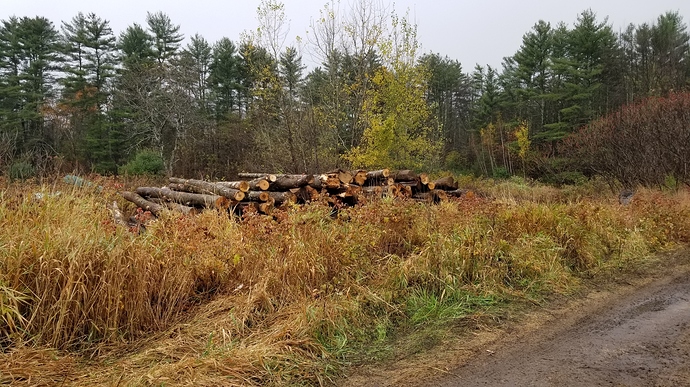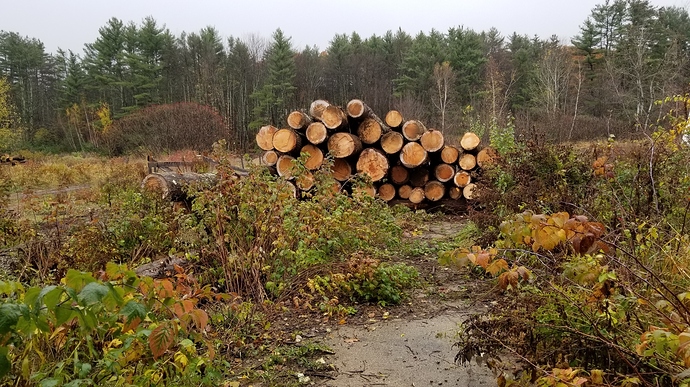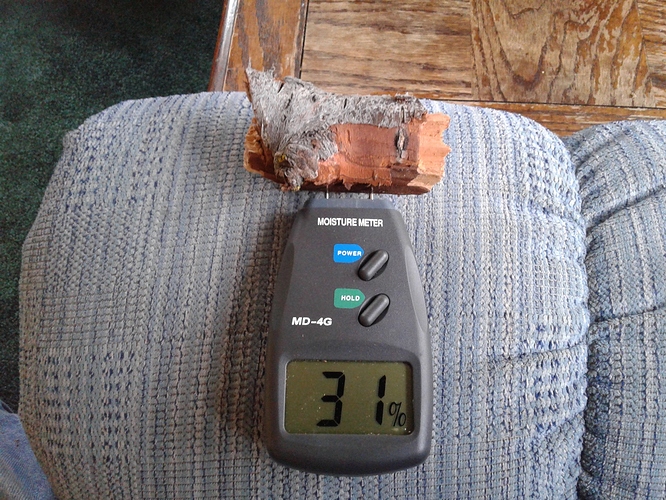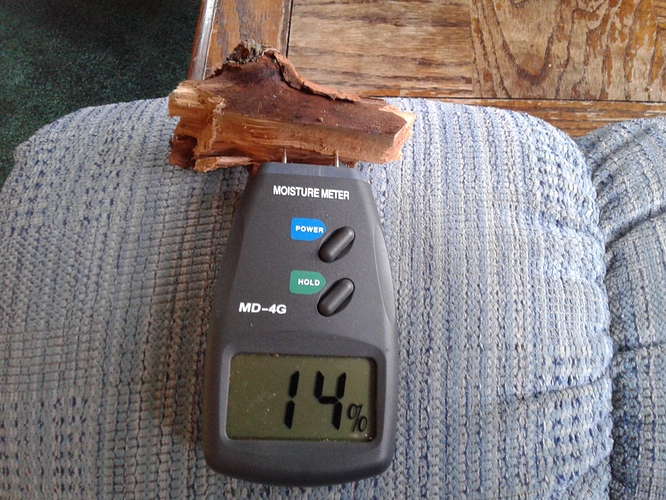You could sell that nice lumber and build something out of the slabwood. 
It looks like you will be busy for a few minutes turning that pile into your new what every you build. Good thing is you have time to figure that part out while it dries… lol.
Jeff, I suspect Wayne has other plans for his slabs 
I can imagine a couple of Dodges are drooling 
Wayne, I bet you just cut lumber so you will have some srcap wood. Come on admit it, you love to chunk it up just as much as you love to drive on wood.
Bob
Yes Mr. Bob .
You are correct about that 
The logger who was doing a cut on the back lot dropped off my wood the other day. The first pile is hardwood for heating I asked for about 12 cord I think they covered that it looks like 24 cord of maple to me. The second pile is red and white pine to fix my barn up. Both piles are one full tractor trailer truck of wood. I am not sure if it will be enough to fix the barn or not but it will be a good start. My barn needs a lot of work. The sad part is this year’s wood for heat is also there in log length so I have a lot of work to do.
Hey DanNH
Really nice they put those fuel logs on bunk-logs, up off the dirt.
That’ll save a lot of chain dulling from groundings.
I figure you have done this before, eh?
Then you know that a top log undercut destabilized can roll down, hop, and bounce out a ways!!
I should have parked the tractor farther back than just 10 feet. Well the top corner of the tractor bucket did stop the log.
Living, doing, is learning alright.
tree-farmer Steve unruh
Yup Steve they put bunks under both piles which is good. And yes this isn’t my first time dealing with these types of piles you do have to watch them when your working around them. I like to take the tractor with a short chain put it around a top log and hang the log off the bucket or place it on a couple of bunks to mark and cut it for fire wood. Can’t be too careful those logs have killed more then one person out in the woods. But a little common since goes a long ways and those tractors take a hit much better then people so let them take the hit for you that is my theory.
Hi all, I have been out chunking the old hard cherry wood or should I say chopping wood the way my chunked works.
I took a moisture check and this is what I found.
I peeled back the bark and stuck the prob in to get the surface reading. Then I checked inside the spilt wood, this is a 2" branch and it didn’t make a difference on the size of the wood.
This wood was pull out of the pile where it has been rained and snowed on for the past few weeks.
When the wood around here dry out it seems to stay dry.
HWWT.
Bob
I love these mecanical splitters. This guy knows how to use what you have. Look at his setup  Works good too.
Works good too.
Looks like the drop axle off a tractor. I sure wish I had the time to pick up more junk/scrap.
Bob; Try cutting a piece of wood with a saw and measure the moisture the same way you are with chunked pieces. I have noticed that sometimes chunking wood, " water" squeezes out of the wood. That may mean you are pushing the water out of some parts and concentrating in others giving some varied readings on the “chunked” wood. TomC
Perhaps you have seen the video of Aqua Das using a small gasifier to melt brass that he casts into bells? For fuel, he liked to use “garden path” chips. I have also noticed that the larger wood chips that have been laying around near my chopping block area and have turned almost white with age are very dry and make excellent fuel. Old screen doors make good cheap drying racks.
Cherry wood sure is pretty. I once saw a kitchen in Minnesota that had all the custom made cabinetry finished in Cherry.
If I stick the prob in the wood where it just split I was getting the same reading, cherry wood is very hard and dense not fun to chainsawing it. Requires a lot of blade sharpening.
I will give it a try with the sawing method and see what the moisture reads.
Bob
I think Bob is doeing correctly. Friction of the saw on that hard wood will allso give false resaults. spliting is the best way to get to the center.
Splitting with the grain will probably give the accurate reading. But ‘‘chunking’’ compresses the wood and forces the moisture to flow something like squeezing a wet rag. Sawing should only affect the surface very slightly. TomC
Correct Tom.
Ha, you shuld see what a Rebak does to green wood. At each slice the water gets pushed to the end and it flows out the end of the limbs when it gets near the blade. @JO_Olsson ever noticed water squirting out of limbs on your rebak?
Oh yes! Like squeezing half an orange.
Sounds like you all want me to do a little test on my wood. Lol
When it gets done raining here I will run a test for you all. I have never seen any water coming off the blade other than rain water the other day, but that just tells me it is time to go inside and do something else.
Bob
